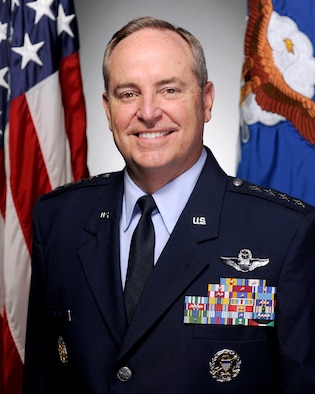In order to get more drone pilots into the fight, the Air Force created the 18X career field for RPA pilots who are only qualified to fly unmanned aircraft. The first pilots to complete 18X training will
reach the end of their six-year commitments to fly drones this fiscal year, according to the Air Force.
"Many of our experienced operators are nearing the end of their active-duty service commitment,
which means they will have a choice in the not-too-distant future to either stay with us or leave the Air Force," James said at a news conference at the Pentagon.
That's why James has signed a memo increasing the monthly flight pay for 18X RPA pilots from a maximum of $650 to $1,500 per month if they stay in the RPA community beyond their
six-year commitment after completion of undergraduate RPA training, Air Force officials said.
Defense.gov Transcript: State of the Air Force press briefing by Secretary James and General Welsh in the Pentagon Briefing Room
 |
| Secretary of the Air Force |
 |
| GENERAL MARK A. WELSH III |
Now, these pilots, just to give you a little color on this, fly six days in a row. They are working 13, 14 hour days on average. And to give you a contrast, an average pilot in one of our manned Air Force
aircraft flies between 200 and 300 hours per year. Again, these are averages.
But in the RPA world, the pilots log four times that much, ranging from 900 to 1100 flight hours per year. And again, this is very stressful operations because mistakes can cost lives.
Finally, I learned that many of our experienced operators are nearing the end of their active-duty service commitment, which means they will have a choice in the not too distant future to either stay with us or leave the Air Force.
Now, to start working on these problems and to remedy some of these issues, I want to share with you some of the steps General Welsh and I are taking now to address it. Our plan is designed to immediately relieve some of this strain while still meeting the combatant commander requirements, and then we of course recognize we'll have more work to do for the somewhat longer term to address the people side of this very important, but nonetheless high-demand weapons system.
So, here are the near-term steps.
- We will maximize the use of the National Guard and reserve and indeed, we will be redirecting some resources in order to provide the money to bring additional personnel on
active duty. - Number two, we will seek recently-qualified active duty RPA pilot volunteers to deploy for six months to some of these distressed RPA units. So, these are folks who have been RPA pilots, but they've gone back into their original airframes, perhaps. We will seek volunteers in
that category to come back into the RPA world. - And number three, we will delay the return of some of the RPA pilots who were on loan to the RPA world from other airframes. So those three items, we are acting on now. And we believe that this will provide some near-term relief to the ops tempo and to boost the quality of life
concerns of this force. - Now, we're also looking at pay. Previously, policy did not allow us to offer retention bonuses to RPA pilots who are only qualified to fly unmanned platforms. We think we need to get this changed and we're working to do so.
As our experienced operators reach the end of their initial active-duty service commitment, we will increase the monthly incentive pay from $650 a month to $1,500 for those RPA pilots while we also explore more permanent incentive plans, which will be a little bit more down the road.
Our combatant commanders expect and demand the unique ISR capabilities that only the Air Force can provide. Airmen who operate RPAs on a daily basis have delivered time critical data. They have prosecuted targets and supported our combatant commanders without fail. But this pace has been unrelenting. And so it's critical that we address these problems now.
Related links
- Air Force Doubles Extra Pay for Drone Pilots to $1,500 per Month | Military.com
- Air Force Moves to Ease Drone Pilot Shortfall and Heavy Workload - ABC News
- Air Force Drone Pilots Are Bummed Out, Overworked: Report - NBC News.com

No comments:
Post a Comment